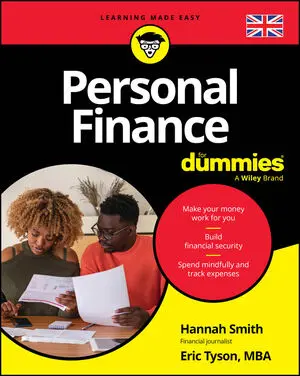Oops! Something went wrong while submitting the form.
Articles & Books From General Personal Finance
Move confidently into your retirement planning years with financial advice from a bestselling personal finance advisor Retirement is lasting longer than it ever has. And a little bit of careful planning can ensure that you spend your retirement—and the years leading up to it—in comfort and financial security.
Your friendly guide to financial success Managing your money and making informed financial decisions for you and your family can be challenging. You're not alone if you find it difficult to understand tax, plan for retirement, create a workable budget, or protect your wealth from unexpected events. This edition of Personal Finance For Dummies, tailored for a UK audience, offers an easy-to-read guide to improving your financial situation, no matter your income level.
Learn to make the simple and sound financial decisions that set you up for long-term success When you've officially begun “adulting” and it's time to make big financial decisions, Personal Finance In Your 20s & 30s For Dummies offers step-by-step advice on building a foundation for your financial futures. Bestselling author and money management guru Eric Tyson shares simple guidance on budgeting, investing, insurance, housing, and more, walking you through how to make the decisions you'll need to make to set yourself up for the rest of your life.
Consejos sólidos de gestión personal del dinero con perspectivas para el mundo actual Finanzas Personales para Dummies ha estado abordando la alfabetización financiera durante 30 años. Esta décima edición continúa proporcionando los consejos que han ayudado a millones a volverse financieramente alfabetizados, mientras aborda problemas financieros actuales.
Cheat Sheet / Updated 04-07-2025
Whether you’re earning your first paycheck, saving up for something big, or just trying to understand how money works, having the right tools can make all the difference. This Cheat Sheet includes a checklist to make sure that your credit report is accurate, and provides some examples of the types of scams you may encounter by people who want to cheat you out of your money.
Get your money game started off on the right foot with this easy-to-read guide In Personal Finance For Teens For Dummies, a team of celebrated financial educators walks you through how to handle your money so you can keep your debt low (or pay it off, if you've already got some), invest intelligently, and build the future you've always dreamed about.
Your to-the-point guide on the essentials of managing your finances The first step in becoming a better personal financial manager is understanding the pillars of personal finance. Financial Literacy Essentials For Dummies is your cheat sheet on understanding how to better manage your finances. Distilled down to the essentials, this book makes it easy for anyone to learn the basics of managing money.
The quick-and-easy guide to unlocking the potential of your income Building Wealth Essentials For Dummies is your go-to guide for learning the key concepts involved in growing your finances, no matter where you're starting. Small and value priced for the budget conscious, this book breaks down investing, taxes, retirement planning, and all the other wealth-building fundamentals you need to know.
Just the essentials you need to know to better manage your money Money Management Essentials For Dummies is your cheat sheet on becoming financially secure, now and into the future. Small and value-priced for the budget conscious, this book offers strategies for anyone to say goodbye to excess debt and prepare to achieve their goals.
Cheat Sheet / Updated 04-30-2024
There are a few areas on your F.I.R.E. (Financial Independence, Retire Early) journey where you may need a little extra help. In this Cheat Sheet, I suggest some resources for some of the best F.I.R.E. calculators, point out where to find a F.I.R.E.-friendly financial planner, and offer a quick reference for organizing and planning your estate.










